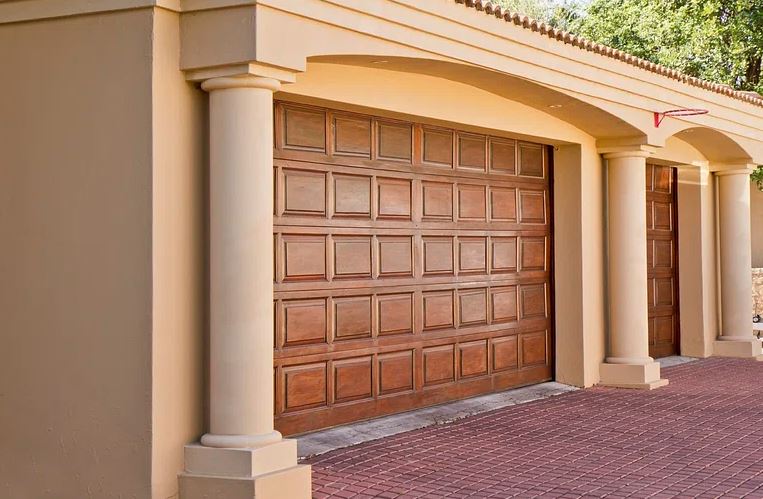 The material of your garage door affects its appearance and determines its durability, maintenance requirements, insulation properties, and overall performance. Let’s explore the various materials available for residential garage doors and provide insights into making an informed decision.
The material of your garage door affects its appearance and determines its durability, maintenance requirements, insulation properties, and overall performance. Let’s explore the various materials available for residential garage doors and provide insights into making an informed decision.
Wooden Garage Doors
Wooden garage doors have a classic and timeless appeal, adding warmth and charm to any home. They can be made from a variety of woods, such as cedar, redwood, or mahogany. These garage doors offer natural beauty and provide good insulation, soundproofing, and the ability to customize them according to your desired style.
However, wooden garage doors require regular maintenance to keep them looking and functioning their best. They need to be sealed properly, refinished periodically, and protected from extreme weather conditions to prevent warping, rotting, or cracking.
Steel Garage Doors
Steel garage doors are durable, low-maintenance, and versatile. They come in various styles, designs, and finishes, allowing homeowners to select something that complements their home’s architecture. They provide excellent security and are often the most budget-friendly option.
Steel garage doors can be insulated to enhance energy efficiency and reduce noise transmission. The insulation also helps regulate the temperature inside your garage, making it more comfortable year-round. However, it is crucial to note that steel doors can dent or rust if they are not properly maintained or exposed to harsh elements.
Aluminum Garage Doors
Aluminum garage doors are lightweight and resistant to rust, making them an excellent choice for coastal areas or humid climates. They are available in a wide range of styles and finishes, offering homeowners the flexibility to find the perfect fit for their home aesthetics.
While aluminum garage doors are less prone to corrosion, they may dent more easily than other materials. However, modern manufacturing techniques have led to the development of stronger aluminum alloys that are more resistant to dents and offer improved durability.
Fiberglass Garage Doors
Fiberglass garage doors are known for their exceptional durability, moisture resistance, and low maintenance requirements. They are available in many colors and finishes that mimic the look of wood or other materials. Fiberglass garage doors are also lightweight, making them easy to operate.
One of the main advantages of fiberglass doors is their resistance to dents and cracks. However, they may not offer the same level of insulation as other materials unless they are specifically designed and insulated for that purpose. These residential garage doors may also fade over time when exposed to direct sunlight.
Vinyl Garage Doors
Vinyl garage doors are resistant to dents and require minimal maintenance. They can withstand extreme weather conditions, including high winds and heavy rain, making them ideal for homes in storm-prone areas. Vinyl garage doors are available in various designs and finishes, including the look of wood if desired.
While vinyl doors offer excellent durability, they may not have the same aesthetic appeal and natural beauty as wooden garage doors. Additionally, they can be more expensive than some other materials.
Tips for Selecting a Garage Door
Selecting a material for your garage door is a crucial decision. Here are some valuable tips to help you choose the most suitable material.
Consider your Climate
If you live in a region with extreme temperatures or high humidity, you should opt for materials that can withstand these conditions. Steel or aluminum garage doors are often recommended for their durability and resistance to harsh weather elements.
Evaluate Durability and Maintenance
Durability is a vital aspect to consider while selecting a garage door material. Wooden doors offer a classic look but require regular maintenance to protect them from weathering and rot. In contrast, steel or vinyl doors are more durable and require less maintenance. Consider your lifestyle and preference for maintenance before making a decision.
Insulation and Energy Efficiency
Garage doors can impact the energy efficiency of your home. If you have living space above or adjacent to your garage, consider investing in an insulated garage door. Insulated doors can help regulate temperature, reduce noise, and lower energy bills. Materials like steel, fiberglass, or vinyl can be insulated and provide excellent energy efficiency.
Aesthetics and Style
The material you choose for your garage door should complement the style and architecture of your home. Wood doors are known for their natural beauty and classic appeal, making them popular for traditional or rustic homes. For contemporary homes, steel or aluminum doors with sleek finishes can create a modern look. Fiberglass and vinyl doors offer a variety of design options that can mimic the appearance of wood or other materials.
Budget
Remember to balance your desired material with your budget constraints. Wooden doors are typically more expensive, while steel and aluminum doors are often more budget-friendly options. Fiberglass and vinyl doors fall somewhere in between.
Key Takeaway
Choosing a material for your residential garage door is an important decision that impacts the aesthetic appeal of your home and its functionality and longevity. Each material has advantages and considerations, such as maintenance requirements, insulation properties, durability, and budget.
